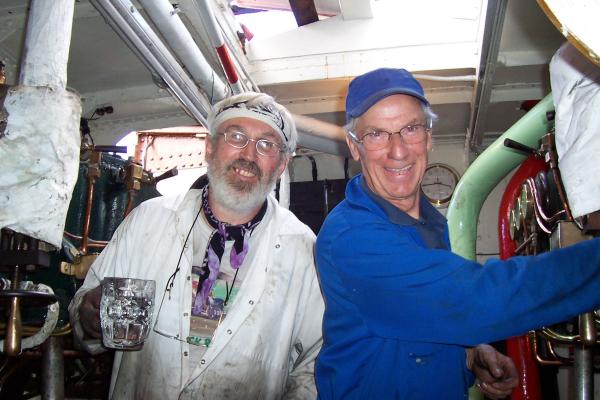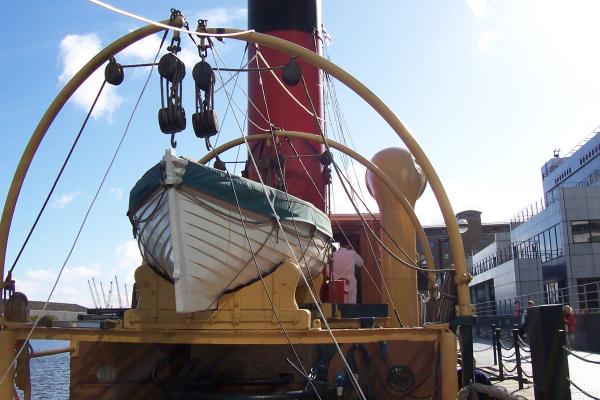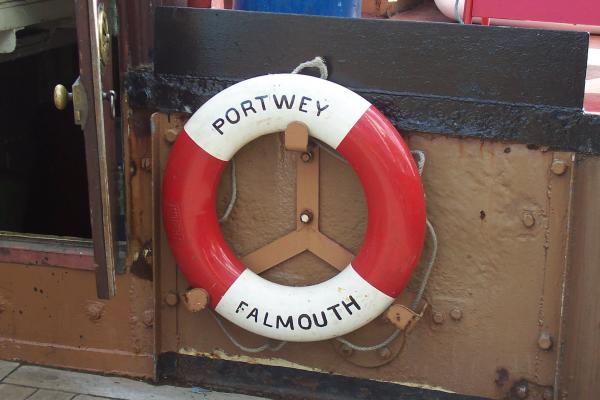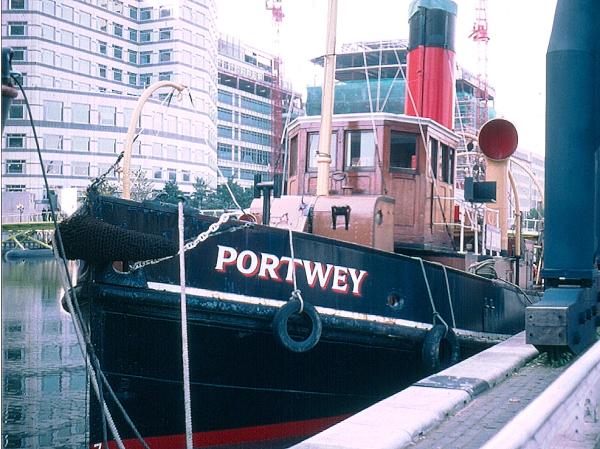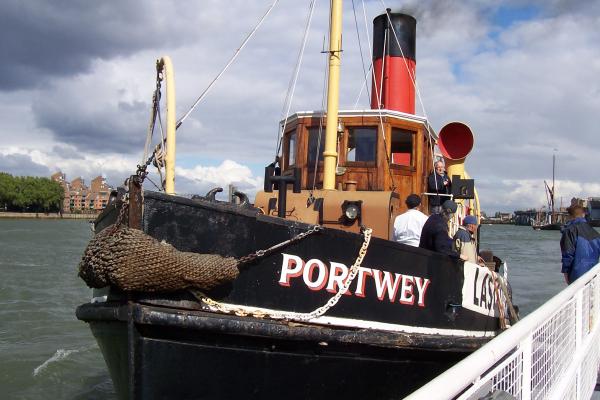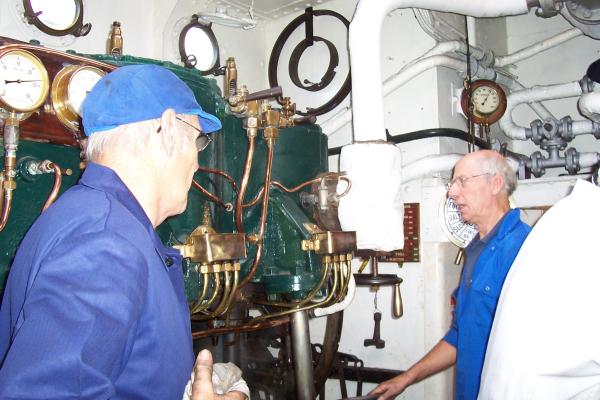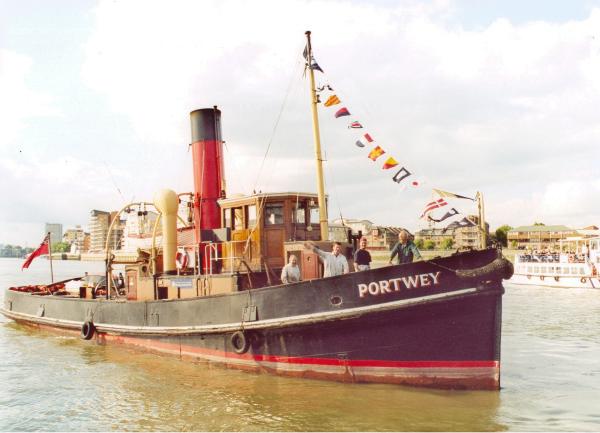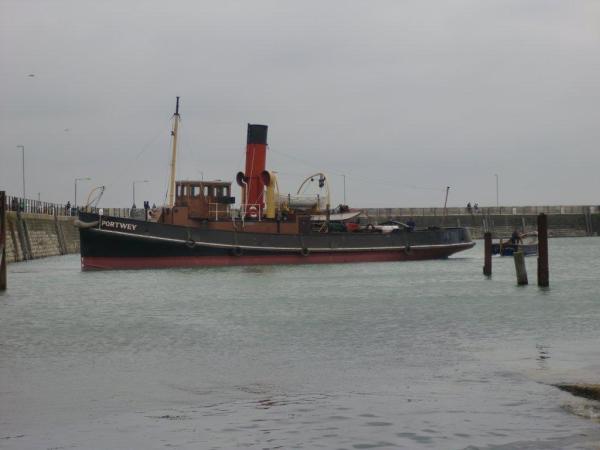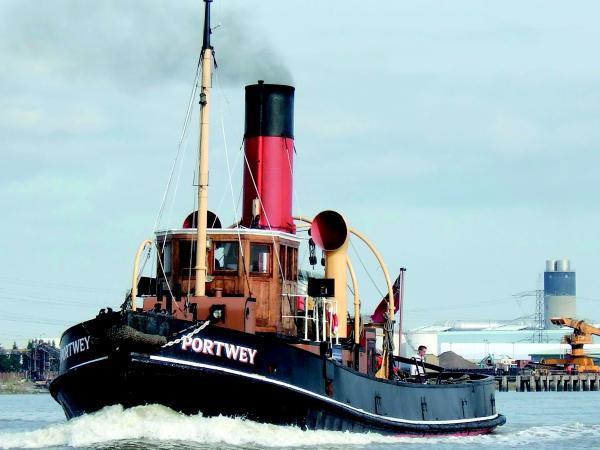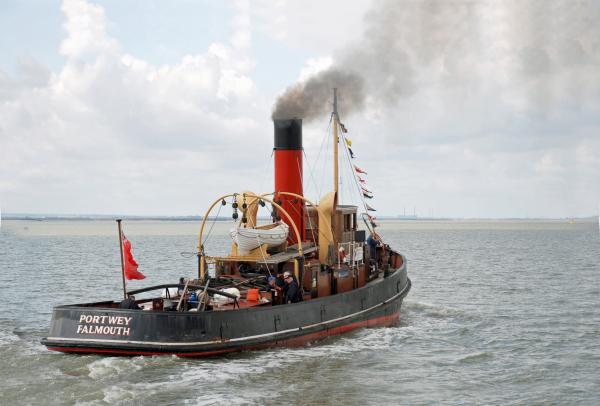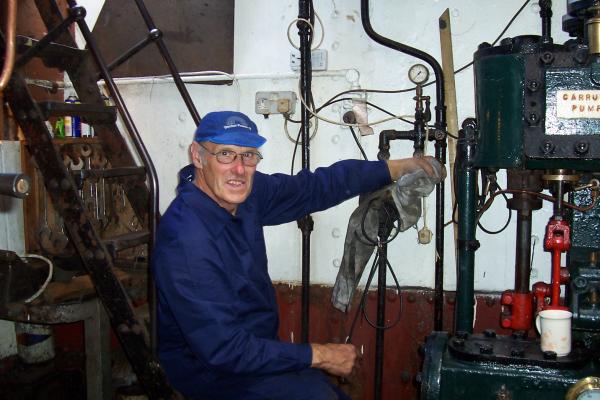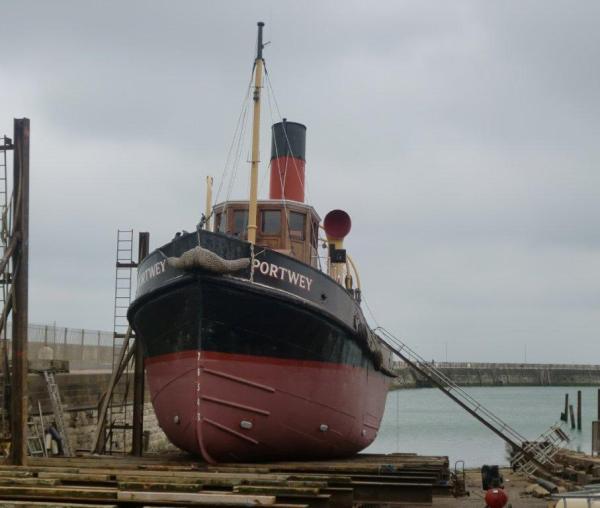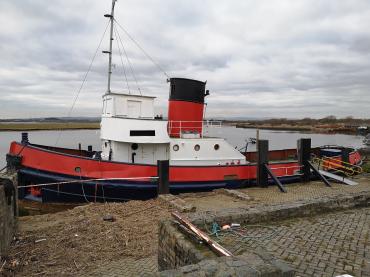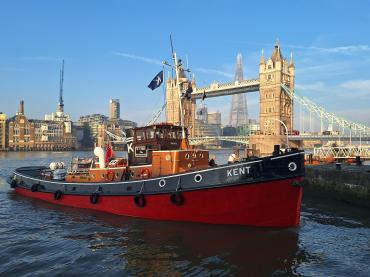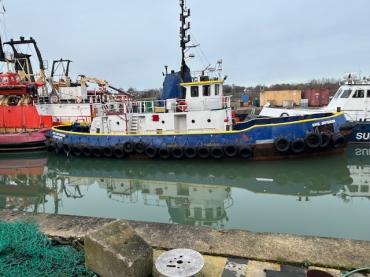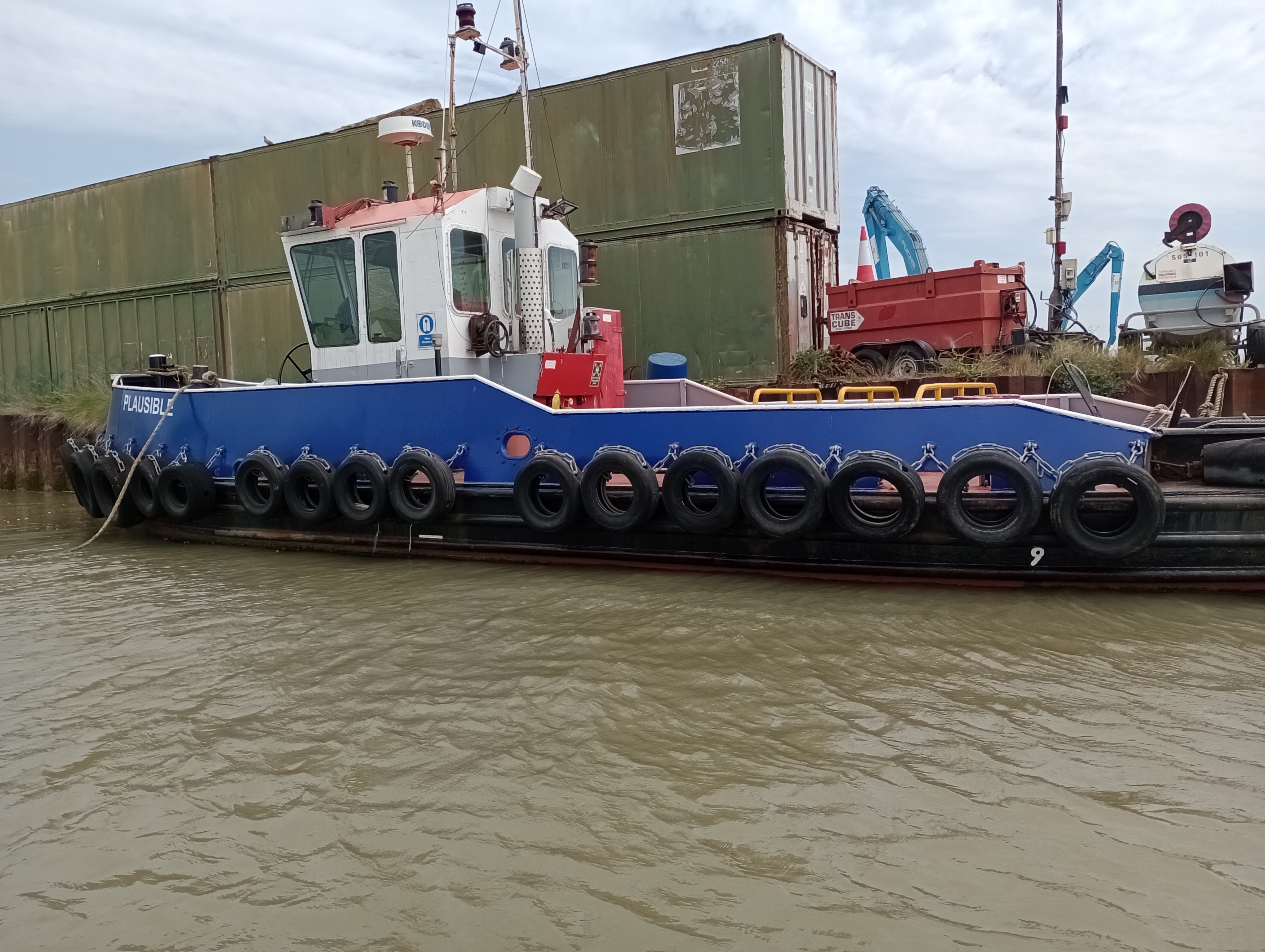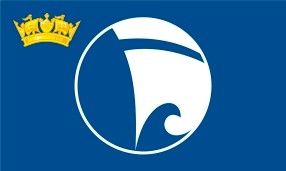
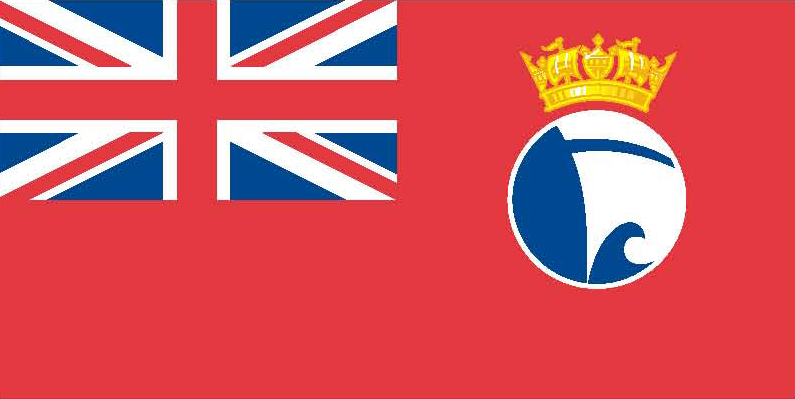
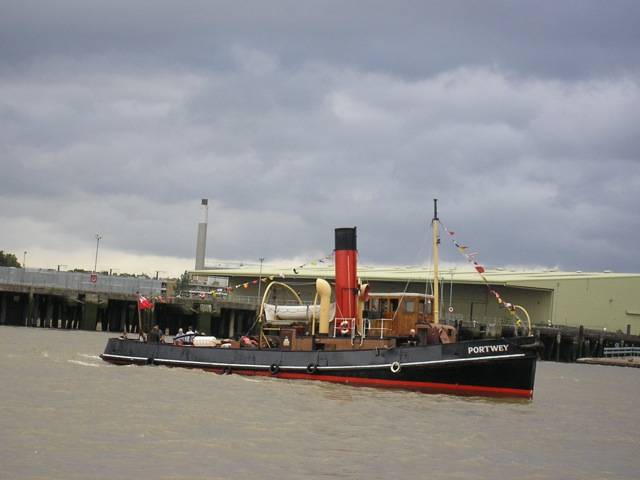
Details
Construction
Dimensions
History
PORTWEY was launched at Harland & Wolff’s yard at Govan, Glasgow, in 1927. She was built for the Portland & Weymouth Coaling Company, to be based in Weymouth, Dorset and arrived on the south coast on 28 April 1928. The Dorset Daily Echo said, “The Portwey came to her new home last week and looks bravely spick and span with her smart red funnel and all her deck gear. The new boat is a box of machinery, has her own salvage gear pumps, all built in, and is a very fine craft for her work.”
PORTWEY worked on towage and harbour service duties. She went to the aid of yachts in heavy seas, extinguished a fire aboard the Danish timber-carrier Bodil, searched for a sunken submarine, and towed many vessels in distress, including the cargo steamer Winslow, and Union Castle’s Winchester Castle. She provided fresh water to the famous J-class yachts Astra, Velsheda and Shamrock and took supplies to their crews.
War Service In 1942: PORTWEY was called up by the Admiralty and moved to Dartmouth in Devon. She narrowly missed being hit by German bombs aimed at the harbour. In 1944 she was allocated to the US forces as they prepared for D Day. She worked at clearing obstructions from the Channel and supplying fresh water to naval vessels. She rescued personnel and landing craft when the disastrous Slapton Sands exercise was attacked by enemy torpedo boats.
After the War, PORTWEY was returned to her civilian owners and resumed her duties as a harbour tug as well as ferrying pilots and customs officers out to ships in the Channel. In 1947 PORTWEY used her powerful pumps to put out a fire at the Queen’s Hotel, Dartmouth, when the local fire brigade’s hoses failed. In 1952 she was sold to the Falmouth Dock and Engineering Company in Cornwall. She rescued the captain and first officer of the cargo ship Flying Enterprise, when the ship capsized and sank while under tow by the tug Turmoil. She worked on the construction of the Lizard lifeboat station, Cornwall, and a ferry slipway at Holyhead, north Wales.
By 1967, coal-fired steam vessels were being replaced by diesel-engined working ships and PORTWEY was laid up to be scrapped. She had the good fortune to be bought by Richard Dobson, the assistant harbour master at Dartmouth. Richard and a group of friends returned the PORTWEY to steaming condition. During the 1960’s and 1970’s PORTWEY was seen at many events on the River Dart and around Torbay.
In 1982 PORTWEY joined the Maritime Trust’s Historic Ship Collection at St Katharine’s Dock near Tower Bridge. The Friends of Portwey continued with restoration and operation of the tug. In 1988 she won the marine category of the British Coal Steam Heritage award. The Steam Tug Portwey Trust was formed in 2000 and purchased the tug from the Maritime Trust.
In November 2025, PORTWEY was officially handed over to The Steam Boat Trust for a nominal fee of £1. Once repairs to her boiler have been carried out, the Trust plans to steam her to Chatham and open her up to the public.
Significance
What is the vessel’s ability to demonstrate history in her physical fabric?
Portwey is a single-decked, riveted steel harbour tug, built in 1927 by Harland & Wolff at Govan in Glasgow for towage and harbour service duties. She is 80 ft (24.8 m) in length with a beam of 18 ft (4.48 m) and a draft of 9 ft (2.7 m). Her gross tonnage is 94 tons (95.5 tonnes). She is the last surviving original, operational, coal-fired, twin screw steam tug in UK. The two-engine design was unusual at the time; the owners specified them to assist in the handling of large coal vessels in the restricted waters of Portland harbour.
Portwey’s original compound reciprocating steam engines remain in operational use. She has a Scotch boiler, of the fire tube, double furnace type, with a working pressure of 140 lbs/sq.in. She carries a water capacity of 10 tons in her forward tank, 5.25 tons in her aft tank, and 18.25 tons in her aft peak tank (total 33.5 tons (34 tonnes)). Her furnace is 6ft long and 4ft wide. She has bunker space for 25 tons of coal.
Portwey is largely unchanged from her original design and build, retaining almost all her original features, including her original wheelhouse and crew cabin. In addition, she retains much of her original equipment, including her auxiliary engines, general service pump, salvage pump, steering engine, anchor windlass, and generator. Some of this predates construction of the tug.
Portwey has been subject to limited adaptation. Her original manual steering wheel was directly coupled to the rudder by chains and rods. This was extremely hard work, and in 1952 a steam steering engine was fitted to provide power steering. In 1994 repairs were carried out to the steel hull plating and internal frames following the discovery of severe corrosion. In 1998-9 her severely corroded boiler smoke box was replaced. In 2002 her original wooden lifeboat was restored using traditional methods, and the teak planking on her aft deck was replaced, with the original rusted bolts drilled out. She is now taken out of the water every three years for the hull to be inspected, repaired, and repainted.
What are the vessel’s associational links for which there is no physical evidence?
Portwey was built for the Portland and Weymouth Coaling Co. She was employed moving coal barges to and from floating storage hulks used to supply deep sea ships. In addition to these duties, she went to the aid of vessels in difficulty. In 1928 she assisted yachts caught in heavy seas, and extinguishing a fire aboard a Danish timber-carrier. She later searched for a sunken submarine, and towed many vessels in distress, including the cargo steamer Winslow and the Winchester Castle. In 1936 she provided fresh water and other supplies for the crews of J-class racing yachts at Portland.
In 1937 she was sold to G.H. Collins & Co. and moved to Dartmouth as a harbour tug for the Channel Coaling Co. With the outbreak of war she was involved in active service, rescuing survivors from vessels sunk by German submarines in 1941. In 1942 she was seconded by the Admiralty for duties at Dartmouth where she narrowly missed being hit by German bombs. In 1944 she was assigned to US forces preparing for D Day. She cleared obstructions from the Channel and supplied fresh water to naval vessels. She was involved in the rescue of American personnel and landing craft when the Slapton Sands exercise was attacked by German torpedo boats.
After the War Portwey was returned to her civilian owners and resumed her duties as a harbour tug, as well as ferrying pilots and customs officers to ships in the Channel. In 1947 her powerful pumps were used to extinguish a fire at the Queen’s Hotel, Dartmouth. In 1952 she was sold to the Falmouth Dock and Engineering Company. She was involved in the rescue of the captain and first officer of the cargo ship SS Flying Enterprise which had capsized and sunk while under tow during a salvage attempt. She later worked on the construction of the Lizard lifeboat station and a ferry slipway at Holyhead. She was laid up in 1967 and saved from the scrapyard by the assistant harbourmaster at Dartmouth with a view to conservation.
Portwey won the marine category as best preserved vessel in the British Coal’s Steam Heritage Awards in 1988.
Portwey was recorded on the National Register of Historic Vessels in 1996 and is a member of the National Historic Fleet.
Portwey has been featured in the following films, programs and documentaries: in 2009 on BBC TV’s The Real Railway Family featuring Clive Groom and his family who volunteer on the Bluebell Railway; on 14 and 15 May 2010 for 20-20 Television for Channel 4 and National Geographic “How we built the Titanic” episode 2; in August 2017 Portwey’s 90th birthday celebration at HMS President in news footage shown on British Forces Overseas broadcasts; on 11 July 2018 in Hollywood Daze Motion Pictures Ltd’s film “Shore Leave”; on 22 July 2018 in a film made by The Old Ships Company, Hobart, Australia; on 30 October2019 for Relsah Production’s entry in the Young Director competition, and on 10 May 2021 for The Wellington Trust, boiler room scenes and interviews for an exhibition documentary “The Lascars, the Lost Workforce.”
How does the vessel’s shape or form combine and contribute to her function?
Portwey was built as a heavy-duty harbour steam tug and her powerful engines and her thick riveted steel hull and superstructure enabled her to fulfil these duties. Her design meant that she was well-fitted for her intended purpose. She required few modifications or adaptations. Her two original propellers, one driven by each engine, proved unsatisfactory during sea trials in 1928 and were changed. After the Second World War her forward cabin was fitted with mahogany side benches and leather cushions, a mess table, coal stove, clothes lockers, toilet facilities and wash basin for the comfort of pilots.
Aesthetically, the vessel is highly representative of her time, being based on a pattern that was used for many tugs in the 1920s, 30s, and 40s. The vessel was built for practicality rather than aesthetic appearance, but her black hull and sweeping lines, along with her tall red and black funnel, are readily recognisable, pleasing to the eye, and characteristic of much UK maritime heritage.
In 1982 Portwey was transferred to the Maritime Trust and transferred to St Katharine’s Dock, London, in the care of the Friends of Portwey. In 1994 a charitable Trust was established, the Steam Tug Portwey Association. She is currently moored at the South Quay, West India Dock in London. She remains in good condition and until as recently as 2022 was regularly steamed, offering 2-hour and whole day cruises on the Thames during the summer, and providing opportunities for the public to visit the vessel at the Classic Boat Festival.
Sources:
The Steam Tug Portwey: A Brief History (Wickford, Essex, Steam Tug Portwey Trust, 2022).
Steam Tug Portwey Trust website. www.stportwey.co.uk.
Portwey, A Pictorial Celebration (2nd edition, Steam Tug Portwey Trust Ltd, 2015)
Paul Brown, Historic Ships: The Survivors (Stroud: Amberley Publishing, 2010): 71-73.
Norman J, Brouwer, International Register of Historic Ships, Anthony Nelson, Edition 2, 1993.
Steamboat Register (Steam Boat Association of Great Britain) https://www.steamboat.org.uk/profiles.php?search=portwey.
“The Portwey Preserved”, Sea Breezes, September 1983.
John Corin, “Still in Steam – Portwey”, Ships Monthly, July 1979: 22-23.
Key dates
-
1927
Built by Harland & Wolff, Govan, to the order of the Portland & Weymouth Coaling Company Limited
-
1940/1945
Controlled by the US Army during World War Two and based in Dartmouth
-
1951
Sold to the Falmouth Dock & Engineering Company
-
1962
Bought by a group for restoration
-
1996
Received an £82,000 grant from the Heritage Lottery Fund
-
2000
The Steam Tug Portwey Trust was created and the vessel moved to West India Dock London
-
2012
Took part in the Avenue of Sail as part of the Queen’s Jubilee Pageant celebrations
Grants
-
June 2013
A Sustainability Award of £1000 towards the costs of hull work was made from the Strategic Development Fund of National Historic Ships UK
-
2002/03
The Heritage Lottery Fund awarded £10.200 for restoration work
-
1996
£82,000 was awarded from the Heritage Lottery Fund for replacement of hull plating.Source: Steam Tug Portwey Trust
Sources
Brouwer, Norman J, International Register of Historic Ships, Anthony Nelson, Edition 2, 1993
Steamboat Register: An illustrated Register of surviving steam vessels in the British Isles, Steam Boat Association of Great Britain, Edition 6, May 1994
Sea Breezes: The 'Portwey' Preserved, September 1983
Corin, John, Ships Monthly: Still in Steam - Portwey, pp22-23, July 1979
Own this vessel?
If you are the owner of this vessel and would like to provide more details or updated information, please contact info@nationalhistoricships.org.uk

